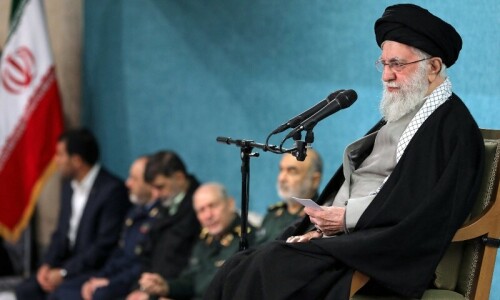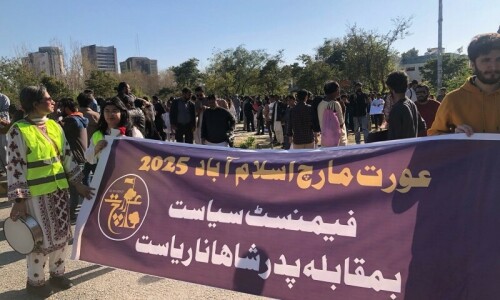ISLAMABAD: The Supreme Court on Wednesday had a word of advice for elected governments that they should put their act together to avoid complications in future.
“The Supreme Court wants to support constitutional governments and it is their duty to comply with the law,” observed Justice Umar Ata Bandial.
The observation came when Justice Bandial while heading a three-judge bench expressed displeasure over slackness on the part of the Sindh government in drafting a model law for the conservation of the precious water resource, installation of flow meters at different beverage factories and revenue collection for using groundwater.
The apex court had taken up a suo motu case regarding the sale of bottled water extracted from underground sources without any charge and the bottled water’s quality and fitness for human consumption as well as a set of review petitions against the order of imposition of water cess.
The court, however, appreciated the Punjab government when its Additional Advocate General (AAG) Chaudhry Faisal Hussain informed it that the province had enacted a law to levy charges on the use of groundwater.
Punjab has enacted law on commercial use of groundwater and collected a hefty amount in water cess, court told
The AAG also informed the court that the Punjab government had recovered a hefty amount of Rs832 million as water cess.
The court asked federal Additional Attorney General Sajid Ilyas Bhatti to commence discussion with all the provinces and the stakeholders on the draft law proposed by the attorney general office, which deals with taxation on water.
The court said that during the consultation it should be ensured that the draft law met the constitutional requirements and an appropriate mechanism should be evolved to meet the objective of the current proceedings and sustaining the efforts of water conservation.
The court noted that the Punjab government had installed flow meters at most of the beverage industries, but clarified that uniform standard of the flow meters should be ensured by the regulatory authorities concerned throughout the country at the cost of the units where such meters would be installed.
Referring to the Sindh government, the SC bench regretted that the province was not organised in its efforts to comply with the earlier court order, adding that there might be a will but the initiative belied the efforts.
Justice Ijaz-ul-Ahsan, a member of the bench, also regretted that the federal government’s funding of Rs6 billion for the development of an outflow canal to construct Nai Gaj dam in Sindh had just disappeared in thin air.
The additional secretary of local government, Sindh, who was present in the court, asked for time to comply with the earlier directive. The court, however, expected that written reports would be filed highlighting what had been done, otherwise the chief secretary of the province would appear before the court to justify the delay on the next date of hearing.
The next hearing will be held sometimes next month.
Some flak was also reserved for Khyber Pakhtunkhwa when the court observed that progress in the province was also slow since flow meters had been installed only at 12 units whereas 13 others were still unregulated.
The province needed to realise the importance of water conservation but it was not taking it seriously, though it had a massive quantity of water, Justice Bandial regretted.
The Islamabad Capital Territory informed the court that it had collected Rs50m from two major beverages units.
The court made it clear that till the flow meters were installed throughout the country, the effort to collect the requisite charges from the commercial industrial concerns for use of groundwater would be on the basis of sales tax. Once the meters are installed, the court will consider applying the volume of water being consumed as the basis to collect the revenue.
Prof Dr Mohammad Ahsan Siddiqui, an environmental scientist who had been appointed head of a special committee on water by the court, was asked to furnish details about a proposed free-of-cost design he had conceived to reduce sewage of water and recycling of the water used.
The project will then be circulated among the stakeholders to comment. The industries which have adopted the design are also required to report about their experience with the technology.
On a suggestion by the federal additional attorney general, the court issued a notice to the Pakistan Council of Water Research, seeking its assistance on water conservation as well as efficient utilisation of scarce resources and waste water treatment.
Published in Dawn, January 16th, 2020













































